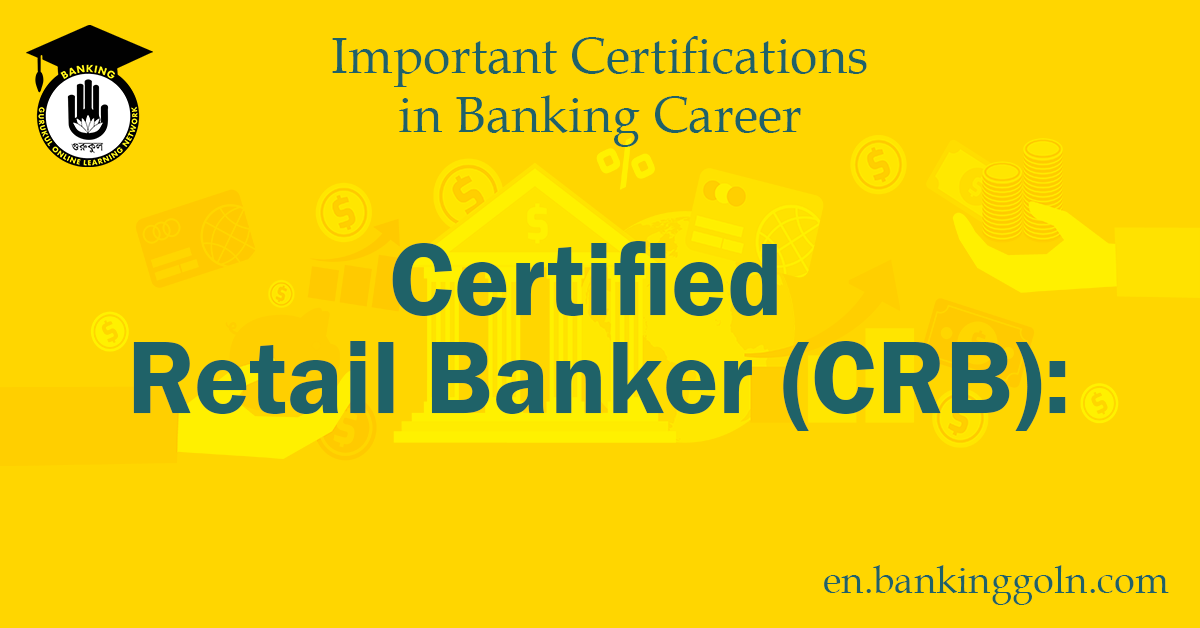Becoming a Certified Retail Banker (CRB) is a milestone that significantly elevates one’s professional status within the retail banking industry. The certification not only provides a comprehensive understanding of retail banking, but it also instills a holistic perspective towards problem-solving, and risk and financial management.
In the intricate world of banking and finance, the CRB serves as a benchmark of excellence, offering retail bankers an opportunity to hone their skills and deepen their knowledge. This in-depth guide takes you through what the CRB certification entails, the benefits it provides, how you can obtain it, and how it can transform your career in retail banking.
Certified Retail Banker (CRB)
What is the Certified Retail Banker (CRB) Certification?
The Certified Retail Banker (CRB) certification is an international accreditation provided by renowned banking and finance institutions. This certification is designed for individuals in the retail banking sector who wish to enhance their knowledge, competency, and expertise. The curriculum is comprehensive, covering key areas such as banking products and services, banking operations, financial advising, risk management, and customer relationship management.
The program’s underlying goal is to produce competent retail banking professionals who can efficiently manage and grow the bank’s retail portfolio. They become adept at providing a superior customer experience while maintaining the bank’s risk and financial management practices.
Why Should You Obtain a CRB Certification?
1. Enhanced Career Prospects
The CRB certification can enhance your career prospects significantly. As a certified retail banker, you showcase your commitment towards continuous learning, skill enhancement, and adherence to best practices in the sector. This makes you a valuable asset in the retail banking industry, leading to better job prospects, promotions, and higher salaries.
2. Comprehensive Knowledge Base
The CRB program provides a well-rounded understanding of the retail banking industry. You get to learn about various banking products and services, the intricacies of banking operations, customer service, financial and risk management, compliance, and much more. This wide knowledge base can enable you to handle complex situations and provide effective solutions, thus making you a more competent banker.
3. Global Recognition
The CRB certification has global recognition, which means certified professionals can practice their skills anywhere in the world. It provides a competitive edge when looking for opportunities in international markets, opening up a world of opportunities.
4. Network Expansion
As part of the CRB program, you get the chance to network with banking and finance professionals from various parts of the world. This can result in meaningful relationships that could potentially lead to future collaborations or opportunities.
How to Become a Certified Retail Banker (CRB)?
To become a Certified Retail Banker, you need to go through a structured certification program. Although the exact requirements can vary depending on the certifying body, here’s a general step-by-step process:
1. Eligibility Check
Before starting the program, check if you meet the eligibility requirements. This typically involves having a bachelor’s degree and a certain number of years of experience in the banking industry.
2. Apply for the Program
Once you’ve confirmed your eligibility, apply for the program through the official website of the certifying body. Fill out the necessary details, upload the required documents, and pay the application fee.
3. Study for the Exams
After acceptance into the program, you’ll have access to various learning materials like textbooks, online resources, and workshops. Use these resources to study for the exams. Many certifying bodies also provide instructor-led sessions to aid in preparation.
4. Take the Exams
Once ready, you’ll have to take a series of exams. These tests cover various aspects of retail banking, such as products and services, operations, risk and financial management, and customer service.
5. Obtain the Certification
After successfully passing the exams, you’ll receive your Certified Retail Banker certification. However, to maintain your certification, you might need to fulfill certain requirements, like earning Continuing Education Credits (CECs) through various activities like attending seminars, workshops, or other banking courses.
The Future for Certified Retail Bankers
The banking industry is continually evolving, and the need for certified retail bankers is expected to rise. As digitization becomes more prevalent, banks are investing heavily in technology to enhance their services and customer experiences. Certified retail bankers, with their comprehensive understanding of banking practices and principles, are ideally positioned to lead these transformations.
Furthermore, as regulatory environments grow more complex, banks need professionals who understand how to navigate these changes while maintaining the bank’s profitability. The rigorous training and education provided by the CRB certification equip retail bankers to handle these challenges effectively.
On top of these, as the focus on customer-centric banking increases, certified retail bankers’ importance will only magnify. With their advanced skills and training in customer service, they can help banks establish stronger relationships with their customers, leading to higher customer retention and satisfaction.
In conclusion, the Certified Retail Banker (CRB) certification is a valuable asset for any retail banking professional looking to enhance their career prospects. The certification provides a comprehensive knowledge base, enhances career prospects, enjoys global recognition, and offers networking opportunities.
Though the journey to becoming a CRB might be challenging, the rewards in terms of knowledge, skills, and career opportunities are immense. So, if you’re ready to take your retail banking career to new heights, start preparing for the CRB certification today!
See more:
- GOLN Technology in Banking Book: Table of Contents
- GOLN Risk Management In Banking Book: Table of Contents
- GOLN Mobile Banking Book : Table of Contents
- GOLN Cyber Security in Banking Book : Table of Contents
- GOLN Banking & Financial Services Compliance Management Book : Table of Contents
- TOC of Career in Banking
